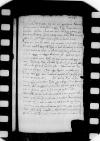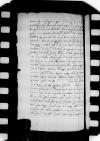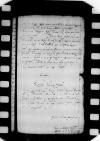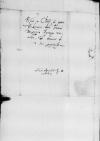Paucis ante diebus ⌊⌋ Reverendissimae Paternitatis Vestrae gratiae, benevolentiae, omnis denique favoris refertas accepi, quibus lectis non minus affectus fui, quam si essem aliqua molestia aut periculo levatus. Intellexi enim illam ipsam veterem, qua me semper a primis annis Reverendissima Paternitas Vestra amplecti dignata est, gratiam et omnem benevolentiam non abolitam, nec spatio temporis excussam, nec officiorum meorum silentio pollutam, nec alia quavis neglegentia robigine decoloratam esse. Gratias igitur, si verba suppeterent animo, Reverendissimae Paternitati Vestrae omnibus modis agere conarer, sed eae ipsae Reverendissimae Paternitatis Vestrae ⌊⌋ tanti mihi sunt, ut nullo pacto credam me illis rescribendo satis facere posse. Deum tamen optimum maximum precabor, ut mihi gratiam suam sanctam largiri dignetur, quo pacto Reverendissimae Paternitati Vestrae tantam gratiam, tantam benevolentiam perpetuis officiis studiisque meis omnibus recompensare queam.
Porro ex ⌊⌋ Reverendissimae Paternitatis Vestrae, quod in negotio publico ⌊terrarum Prussiae⌋ opera et diligentia mea dominis oratoribus, dominis meis gratiosis et fautoribus observandis apud
s(acram) or s(erenissimam)⌈s(acram)s(acram) or s(erenissimam)⌉ ⌊regiam maiestatem⌋ non defuerim, gratum Reverendissimae Paternitati ms. Paternitatis(!)
⌈PaternitatiPaternitati ms. Paternitatis(!)
⌉ Vestrae esse perspectum habeo. Sed cum adhuc unum finem studia mea, rationes omnes et animi propositum collocaverim, ut non solum iis, qui sub manu
s(acrarum) or s(erenissimarum)⌈s(acrarum)s(acrarum) or s(erenissimarum)⌉ ⌊regiarum maiestatum⌋, dominorum nostrorum clementissimorum sunt, verum et advenis et ceteris omnibus causam iustam habentibus, in omni re iusta, quantum aequitas permitteret, opera mea, studio, diligentia, consilio denique prodessem. Maxime vero promptiorem et diligentiorem me esse decet, quod et summopere nitor ad promovendas res Pru BCz, 1599, p. 816tenicas, idque cum ob singularem gratiam benevolentiamque Reverendissimae Paternitatis Vestrae et animum propensum dominorum oratorum, quem mihi, quam ut par est hidden by binding⌈[t]t hidden by binding⌉ dici, exhibuerunt, tum ob libertatem quam quosque, qui auxilio Dei hidden by binding⌈[i]i hidden by binding⌉ gradum aliquem dignitatis assecuti sunt, firmiter tueri ac defendere.
BCz, 1599, p. 816tenicas, idque cum ob singularem gratiam benevolentiamque Reverendissimae Paternitatis Vestrae et animum propensum dominorum oratorum, quem mihi, quam ut par est hidden by binding⌈[t]t hidden by binding⌉ dici, exhibuerunt, tum ob libertatem quam quosque, qui auxilio Dei hidden by binding⌈[i]i hidden by binding⌉ gradum aliquem dignitatis assecuti sunt, firmiter tueri ac defendere.
Adductus igitur rationibus his, ita ut decuit aequumque fuerat, dominis oratoribus, dominis meis gratiosis et amicis observandis opera, licet exigua, prodesse apud
s(acram) or s(erenissimam)⌈s(acram)s(acram) or s(erenissimam)⌉ ⌊regiam maiestatem⌋, dominum nostrum clementissimum {clementissimum}, conatus sum conaborque, et maxime nunc, citra omnem hidden by binding⌈[em]em hidden by binding⌉ fucatam simulationem scriptis Reverendissimae Paternitatis Vestrae percitus, ut opera hidden by binding⌈[ra]ra hidden by binding⌉ mea inanis non esset. Quamvis autem
s(acra) or s(erenissima)⌈s(acra)s(acra) or s(erenissima)⌉ ⌊regia maiestas iunior⌋, dominus noster hidden by binding⌈[inus noster]inus noster hidden by binding⌉ clementissimus, a s(acra) or s(erenissima)⌈s(acra)s(acra) or s(erenissima)⌉ ⌊regia maiestate seniore⌋ nondum responsum acceperit, ad hidden by binding⌈[d]d hidden by binding⌉ me tamen scriptis ab amicis meis perlatum est preces magnifici ⌊Ioannis a Baysen⌋ castellani Elbingensis exaudituras esse bonum [...] hidden by binding⌈[...][...] hidden by binding⌉ opinatur successum habituras. Quare et ego ad eam spem deducor et cetera negotia Prutenica prospere successura, quod flagrante hidden by binding⌈[nte]nte hidden by binding⌉ desiderio exspecto fieri.
Novi nihil mihi est, quod Reverendissimae Paternitati Vestrae significem hisce litteris. Pridie ⌊regiae maiestatis iunioris⌋ cubicularius e ⌊Cracovia⌋ venit, qui ait ⌊comitias(!)⌋ Cra hidden by binding⌈[ra]ra hidden by binding⌉coviae iam esse finitas, in quibus inter cetera id praecipue constitutum hidden by binding⌈[tutum]tutum hidden by binding⌉ st, ut esset generalis expeditio in bellum, quamvis hostis ⌊Regni⌋ nondum [...] hidden by binding⌈[...][...] hidden by binding⌉tris(?) est, sed tamen ut omnes essent parati, si necessitas postularetur, nam au hidden by binding⌈[u]u hidden by binding⌉ditur hostes Regni aliquid moliri contra ⌊regem⌋ nostrum. Deinde his hidden by binding⌈[his]his hidden by binding⌉ in ⌊comitiis⌋ nuntii terrarum petierunt a
s(acra) or s(erenissima)⌈s(acra)s(acra) or s(erenissima)⌉ ⌊regia maiestate seniore⌋, ut sua s(acra) or s(erenissima)⌈s(acra)s(acra) or s(erenissima)⌉ regia hidden by binding⌈[regia]regia hidden by binding⌉ maiestas pro s(acra) or s(erenissima)⌈s(acra)s(acra) or s(erenissima)⌉ ⌊regia maiestate iuniore⌋ mittere eique res regendas, quas  BCz, 1599, p. 817 maiestas sua regia regere nequit prae senectute, committere dignaretur. Quod sua ⌊regia maiestas senior⌋ brevi se facturam pollicita est.
BCz, 1599, p. 817 maiestas sua regia regere nequit prae senectute, committere dignaretur. Quod sua ⌊regia maiestas senior⌋ brevi se facturam pollicita est.
Plura si qua contigerint Reverendissimae Paternitati Vestrae oblato certo nuntio sine mora scribam. Interim Reverendissimam Paternitatem Vestram maiorem in modum oro et Reverendissima Paternitate Vestra sua gratia et singulari benevolentia, qua me Reverendissima Paternitas Vestra amplecti coepit, non desistere dignetur. Quod ego perpetuis et paratissimis officiis meis promereri enitar Reverendissimae Paternitati Vestrae.
Cuius gratiae me meaque omnia officia commendo et Eandem salvam, incolumem et faustam in annos quam longissimos esse ex animo opto et desidero.
 BCz, 1599, p. 816tenicas, idque cum ob singularem gratiam benevolentiamque Reverendissimae Paternitatis Vestrae et animum propensum dominorum oratorum, quem mihi, quam ut par est hidden by binding⌈[t]t hidden by binding⌉ dici, exhibuerunt, tum ob libertatem quam quosque, qui auxilio Dei hidden by binding⌈[i]i hidden by binding⌉ gradum aliquem dignitatis assecuti sunt, firmiter tueri ac defendere.
BCz, 1599, p. 816tenicas, idque cum ob singularem gratiam benevolentiamque Reverendissimae Paternitatis Vestrae et animum propensum dominorum oratorum, quem mihi, quam ut par est hidden by binding⌈[t]t hidden by binding⌉ dici, exhibuerunt, tum ob libertatem quam quosque, qui auxilio Dei hidden by binding⌈[i]i hidden by binding⌉ gradum aliquem dignitatis assecuti sunt, firmiter tueri ac defendere. BCz, 1599, p. 817 maiestas sua regia regere nequit prae senectute, committere dignaretur. Quod sua
BCz, 1599, p. 817 maiestas sua regia regere nequit prae senectute, committere dignaretur. Quod sua 


